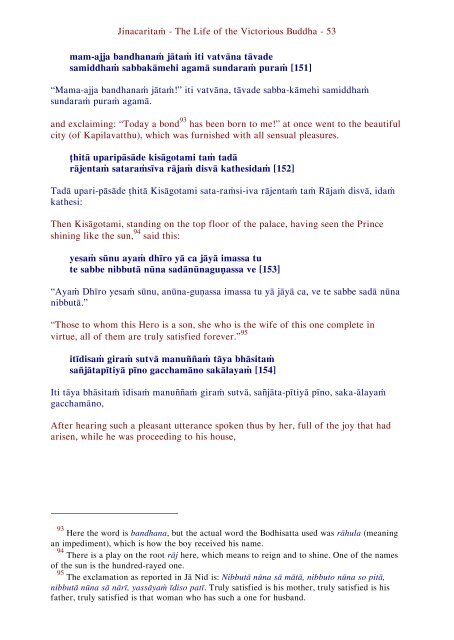Jinacaritaṁ: The Life of the Victorious Buddha
A Pāli and English line by line (interlinear) version of this Medieval verse biography of the Buddha from his Bodhisatta aspiration to the founding of the Jetavana monastery (together with extensive annotation).
A Pāli and English line by line (interlinear) version of this Medieval verse biography of the Buddha from his Bodhisatta aspiration to the founding of the Jetavana monastery (together with extensive annotation).
Create successful ePaper yourself
Turn your PDF publications into a flip-book with our unique Google optimized e-Paper software.
<strong>Jinacaritaṁ</strong> - <strong>The</strong> <strong>Life</strong> <strong>of</strong> <strong>the</strong> <strong>Victorious</strong> <strong>Buddha</strong> - 53<br />
mam-ajja bandhanaṁ jātaṁ iti vatvāna tāvade<br />
samiddhaṁ sabbakāmehi agamā sundaraṁ puraṁ [151]<br />
“Mama-ajja bandhanaṁ jātaṁ!” iti vatvāna, tāvade sabba-kāmehi samiddhaṁ<br />
sundaraṁ puraṁ agamā.<br />
and exclaiming: “Today a bond 93 has been born to me!” at once went to <strong>the</strong> beautiful<br />
city (<strong>of</strong> Kapilavatthu), which was furnished with all sensual pleasures.<br />
ṭhitā uparipāsāde kisāgotami taṁ tadā<br />
rājentaṁ sataraṁsīva rājaṁ disvā ka<strong>the</strong>sidaṁ [152]<br />
Tadā upari-pāsāde ṭhitā Kisāgotami sata-raṁsi-iva rājentaṁ taṁ Rājaṁ disvā, idaṁ<br />
ka<strong>the</strong>si:<br />
<strong>The</strong>n Kisāgotami, standing on <strong>the</strong> top floor <strong>of</strong> <strong>the</strong> palace, having seen <strong>the</strong> Prince<br />
shining like <strong>the</strong> sun, 94 said this:<br />
yesaṁ sūnu ayaṁ dhīro yā ca jāyā imassa tu<br />
te sabbe nibbutā nūna sadānūnaguṇassa ve [153]<br />
“Ayaṁ Dhīro yesaṁ sūnu, anūna-guṇassa imassa tu yā jāyā ca, ve te sabbe sadā nūna<br />
nibbutā.”<br />
“Those to whom this Hero is a son, she who is <strong>the</strong> wife <strong>of</strong> this one complete in<br />
virtue, all <strong>of</strong> <strong>the</strong>m are truly satisfied forever.” 95<br />
itīdisaṁ giraṁ sutvā manuññaṁ tāya bhāsitaṁ<br />
sañjātapītiyā pīno gacchamāno sakālayaṁ [154]<br />
Iti tāya bhāsitaṁ īdisaṁ manuññaṁ giraṁ sutvā, sañjāta-pītiyā pīno, saka-ālayaṁ<br />
gacchamāno,<br />
After hearing such a pleasant utterance spoken thus by her, full <strong>of</strong> <strong>the</strong> joy that had<br />
arisen, while he was proceeding to his house,<br />
93 Here <strong>the</strong> word is bandhana, but <strong>the</strong> actual word <strong>the</strong> Bodhisatta used was rāhula (meaning<br />
an impediment), which is how <strong>the</strong> boy received his name.<br />
94 <strong>The</strong>re is a play on <strong>the</strong> root rāj here, which means to reign and to shine. One <strong>of</strong> <strong>the</strong> names<br />
<strong>of</strong> <strong>the</strong> sun is <strong>the</strong> hundred-rayed one.<br />
95 <strong>The</strong> exclamation as reported in Jā Nid is: Nibbutā nūna sā mātā, nibbuto nūna so pitā,<br />
nibbutā nūna sā nārī, yassāyaṁ īdiso patī. Truly satisfied is his mo<strong>the</strong>r, truly satisfied is his<br />
fa<strong>the</strong>r, truly satisfied is that woman who has such a one for husband.


















